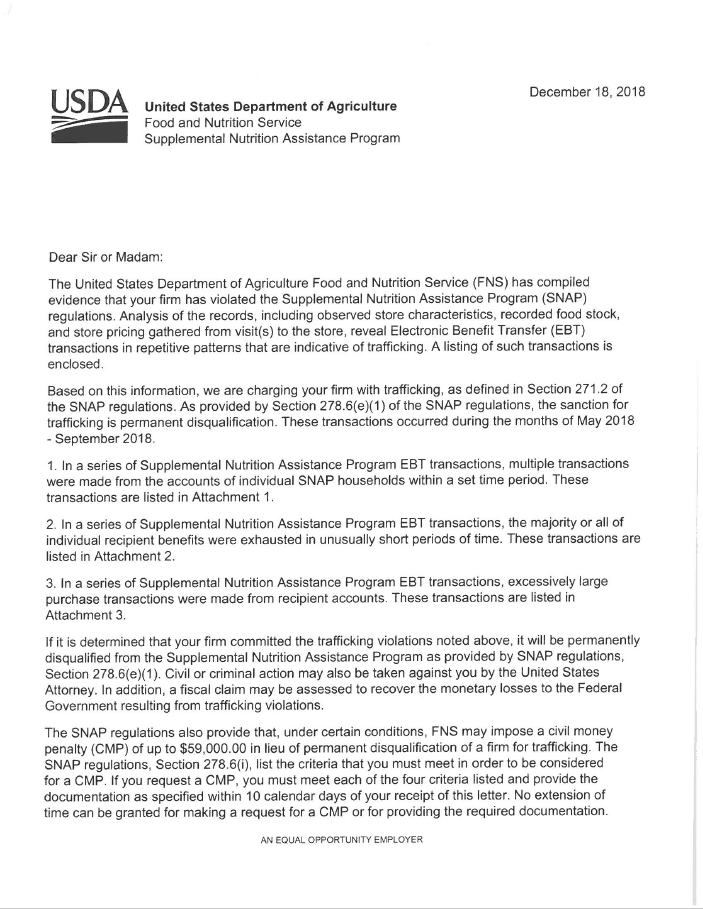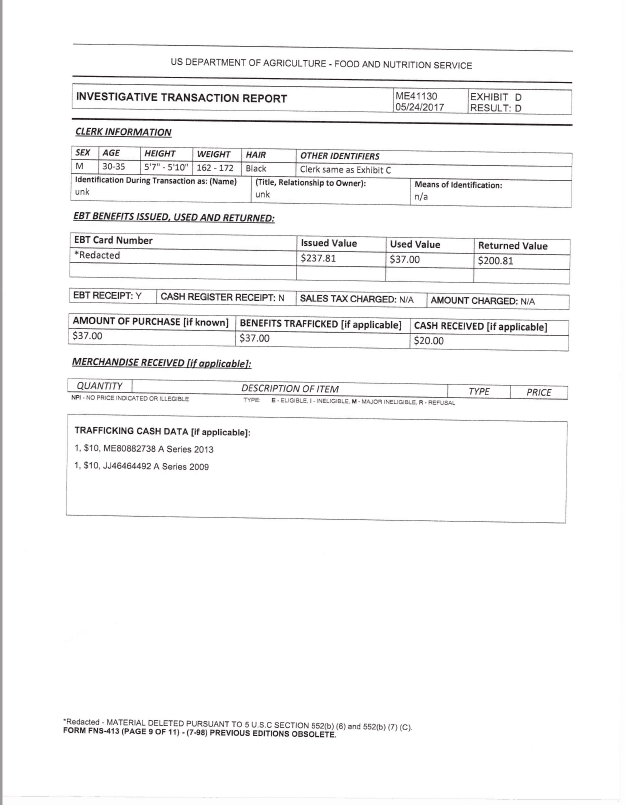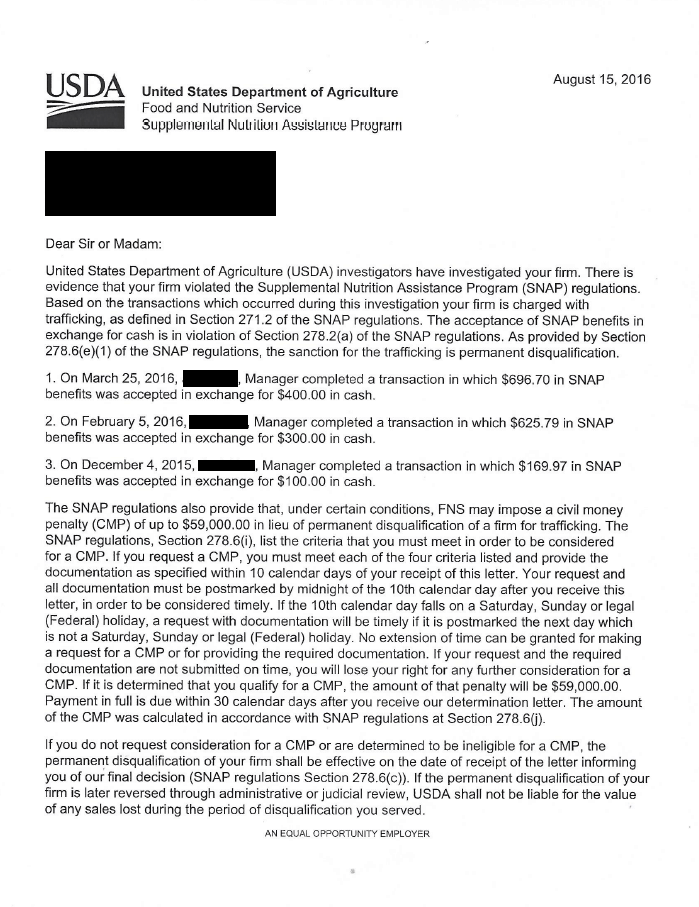Trafficking in SNAP Benefits is the worse offense an EBT retailer can be accused of. It's also the most common SNAP violation that the USDA charges. If your store has been accused of trafficking, the penalties are harsh (permanent disqualification at least) and swift. It is also possible that criminal charges could be involved. However, trafficking SNAP benefits isn't just a claim that your store misused a customer's EBT card. There are a number of different actions that the USDA's Food and Nutrition Service has included in the trafficking definition. Typically, trafficking involved the exchange of SNAP benefits for cash, either directly or indirectly. The USDA's Trafficking definition spells out six different types:
- Buying/Selling/Stealing an electronic benefit transfer EBT card (or its numbers) for cash (or other items of value) is trafficking;
- Exchange guns, ammunition, explosives or drugs for SNAP benefits or an EBT card is trafficking;
- Purchasing items that have a bottle refund, discarding the contents and exchanging the bottle for the refund is trafficking;
- Purchasing eligible food (or things like Red Bull) with an EBT card for purposes of selling the food to someone else is trafficking; and
- When an EBT participant purchases food with their card and exchanges it to a SNAP retailer store for cash or credit, that's trafficking.
- Giving "cash back" on an EBT transaction, regardless of whether or not the store receives a financial benefit from the transaction.
Have I Been Charged with Trafficking?
As a retailer, there are three ways to get charged with food stamp trafficking, all of which start with a letter. The "Charge Letter" is delivered by UPS in the overnight mail, and it outlines specific allegations against your store. The most common of the trafficking charges is what is called an "EBT" case. This stands for Electronic Benefit Transfer - but it is a data analysis case. The Charge Letter looks like this:

In these charge letters, the USDA has listed the different transaction pattern categories that they think support a finding of SNAP trafficking. Attached to this letter will be a number of Exhibits with lists of transactions. The Department has testified in a number of cases that they believe these cases involve "cash back" trafficking transactions. We address what to do with an EBT SNAP trafficking charge letter here, but success in these cases almost always requires an attorney's help.
Retailer Investigative Branch SNAP Trafficking Letter
The second type of food stamp trafficking charge letter is compiled by the Retailer Investigations Branch, or RIB. These charges involve an undercover agent from the USDA secret shopping your store. These letters have affidavits attached to them that look like this:

These cases are much more detailed than the EBT driven cases, and require an attorney to be successfully defended. Many of these cases involve Red Bull, or other energy drinks. The investigator claims that SNAP trafficking happened when a retailer (or clerk) instructed an investigator to go and buy Red Bull with their EBT benefits. The Red Bull would then be resold to the retailer, who would pay cash for the drinks. We find that the USDA investigators often misrepresent the events, and that SNAP trafficking did not occur. Our firm has been successful in defending a number of stores who have been accused of trafficking on those grounds. We offer free consultations, so if you have received one of these letters, call us as soon as you can.
Office of Inspector General (OIG) SNAP Trafficking Letter
The final charge letter is the result of an Office of Inspector General investigation. These are also undercover investigations, but they're usually conducted for purposes of criminal charges. Typically, OIG investigators attempt to identify food stamp trafficking rings. They're rarely targeted on a specific store. An OIG letter that claims SNAP trafficking occurred looks like this:

These letters involve criminal investigations, though they do not always lead to criminal charges to the store or the store's owner. Do not try to handle these matters on your own - we offer free consultations to help stores avoid making these problems bigger.
What To Do If You've Been Charged with SNAP Trafficking
Trafficking cases are serious. Because of their life long effects, you need to fight the charges brought by the USDA. If you don't respond to the Charge Letter, or do so incorrectly, you will be permanently disqualified. We have compiled an SNAP Violation Guidebook about how the cases work and what you can expect from our representation.
However, the first steps are often the most important steps of the entire process. So here's a quick guide to see what we are going to need from you:
- If you have transaction receipts showing the purchased items in the transactions listed by the USDA, we need them.
- We need inventory records - usually invoices and receipts for the food your store has purchased.
- Tax records (like sales tax and 1040's) are always helpful.
- Profit and loss records are also useful. We need these.
Lastly, we've mentioned above that you need to contact an attorney for these cases. Our firm is the oldest and most knowledgeable SNAP Trafficking firm in the nation. We have the largest repository of knowledge on the Supplemental Nutrition Assistance Program of any firm, and the Department knows us on a first name basis. Who you select to represent you will be a factor in the outcome of your case. Don't settle for delaying and stalling strategies: plan your case to win your case.
Call us today for your free consultation, 1-833-SNAP-Law.
